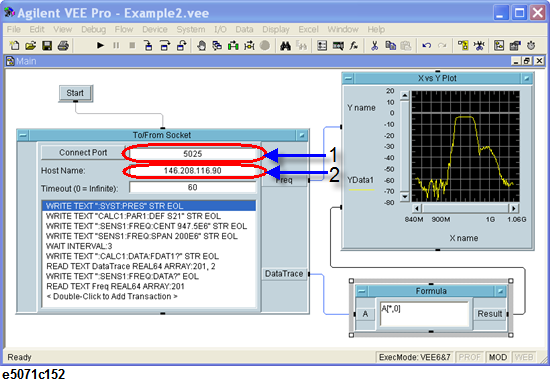
The LAN (Local Area Network) remote control system provides two methods: controlling the E5072A using the SICL-LAN server and controlling the E5072A using the telnet server.
Use a LAN cable to connect between the E5072A and the external controller (computer). The following figure shows the overview of the system configuration of the LAN remote control system.
Configuration of the LAN remote control system

E5072A
External controller (PC or workstation that can be connected to LAN)
Other devices (other instruments and/or peripherals that serve your purpose)
LAN cables
In the control system using the SICL-LAN server, communication between the external controller (client) and the E5072A (server) is performed using the SICL-LAN protocol. Communication is performed using SICL (Standard Instrument Control Library). You can control the E5072A by programming using SICL or VISA with the C language in the UNIX environment, or Visual C++, Visual Basic, or VEE in the Windows environment.
To communicate with the external controller, follow these steps to turn ON the SICL-LAN server of the E5072A in advance.
Turn ON the network to activate the SICL-LAN Server
of the E5072A.
System > Misc
Setup > Network Setup >
Enable [ON]
In order to establish communication to the E5072A using the TCP/IP protocol, you need to set the I/O interface of the external controller in advance. This section shows the setting procedure when using the external controller in the Windows environment.
You must install the Keysight I/O Libraries on your PC in advance. Use Keysight I/O Libraries Suite 14.2 or later.
From your PC's Start menu, click Program > Keysight I/O Libraries Suite > Agilent Connection Expert to open the Keysight Connection Expert setting screen.
In the Keysight Connection Expert setting screen,
select LAN(TCPIP0) in the Instrument
I/O on this PC frame, and then click I/O
Configuration > Add Instrument.
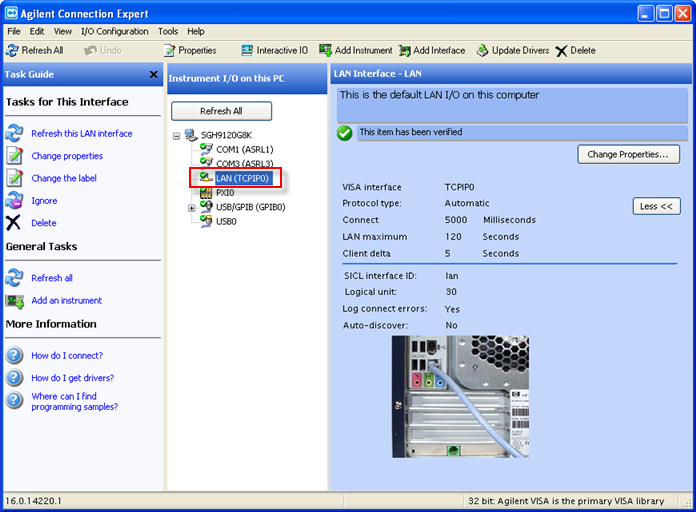

In the Add Instrument screen, select Add Address tab.

Check Use IP Address and enter the IP address of the E5072A. Then click Test Connection to check the connectivity. "The instrument is present" message will prompt beside the Test Connection button. Click OK.
In the Keysight Connection
Expert screen, check that the E5072A has been added under LAN(TCPIP0)
in the Instrument I/O on this PC frame.
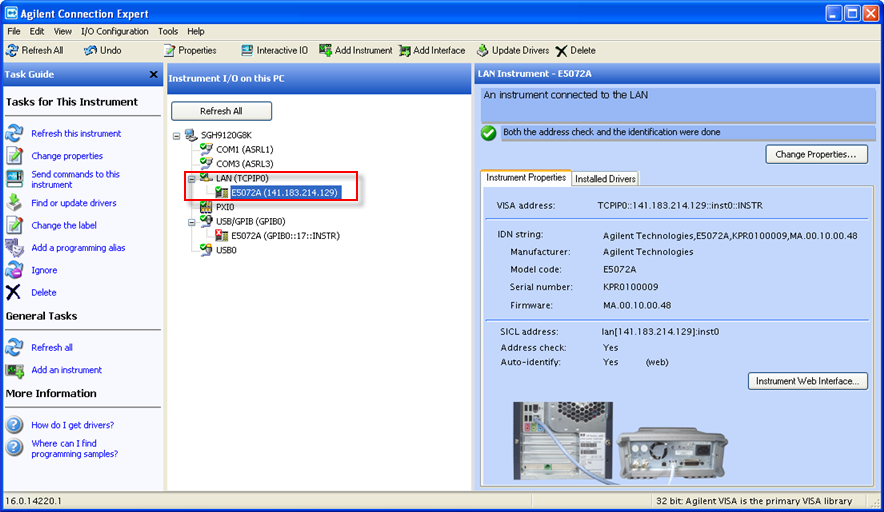
You can control the E5072A by programming using SICL with the C language in the UNIX environment, or Visual C++ or Visual Basic in the Windows environment.
Keysight VEE allows you to control the E5072A via the I/O interface. The following example shows how to control the E5072A that is set as follows: the address of the SICL-LAN server is 17 and the IP address is 146.183.214.129.
When using Keysight VEE for PC, use Keysight VEE Pro 7.5 for Windows or later.
On the Keysight VEE's
I/O menu, click Instrument
Manager
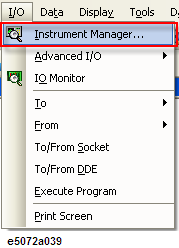
In Instrument Manager,
click Add Instrument icon.
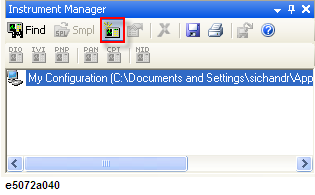
A
new windows appears for the selection of Interface Type. Select TCPIP and click OK.
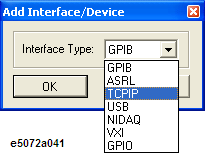
In Instrument
Properties, type any name for the Instrument in Name (for example:
ENA or E5072A), and add TCPIP0::<IP Address> in the TCIP
Address, where <IP Address> is the IP address for E5072A.
For example, if the IP address for E5072A is 141.183.214.129, then
the value for TCPIP Address would be
TCPIP0::141.183.214.129. Click OK after
entering all the parameters.

The
Instrument manager displays the connection with E5072A.
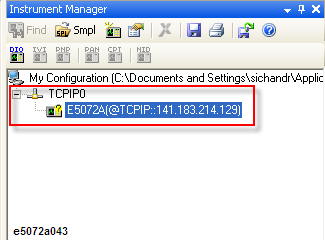
The following figure shows an example of control using the I/O interface that has been set in the above procedure.
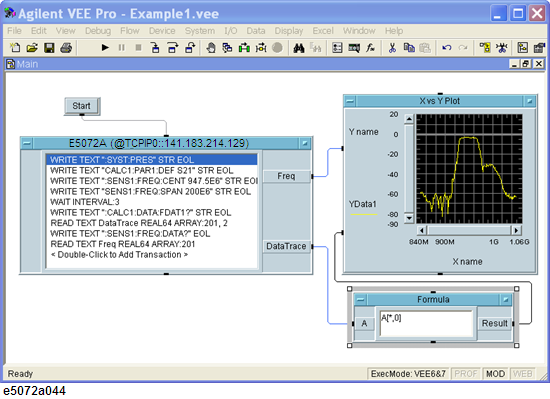
In the control system over telnet server, communications are performed through connection between the sockets provided by the processes of the external controller and the E5072A to establish a network path between them.
A socket is an endpoint for network connection; port 5024 and port 5025 are provided for the sockets for the E5072A. Port 5024 is provided for conversational control using telnet (user interface program for the TELNET protocol) and port 5025 for control from a program.
To use telnet, port 5024 and 5025 should be opened through Windows firewall.
By opening port 5024 and 5025, the E5072A can be controlled remotely using telnet. It is recommended to close port 5024 and 5025 after usage from the security prospective.
To communicate with the external controller, follow these steps to turn on the telnet server of the E5072A in advance.
System > Misc Setup > Network Setup > Enable [ON]
You can use telnet to perform conversational control by sending SCPI commands to the E5072A on a message-by-message basis. For telnet, the socket of port 5024 is used for communications.
In this example, in order to show you the control procedure using telnet, you control the E5072A (IP address: 146.208.116.90 and host name: E5072A) from the external controller in the Windows environment.
Open the MS-DOS command prompt screen.
At the MS-DOS prompt, type telnet 146.208.116.90 or telnet E5072A and press the return key.
The telnet screen opens.
Type a command and press the return key; it is sent to the E5072A and executed. If you enter a command that queries some data, the query response is displayed below the line you have entered the command.
The following figure shows the screen after using the :SYST:PRES command to reset, the :SENS{1-36}:FREQ:STAR command and :SENS{1-36}:FREQ:STOP command commands to set the sweep start value and stop value to 1 GHz and 2 GHz respectively, and checking the settings.
Example of control using telnet
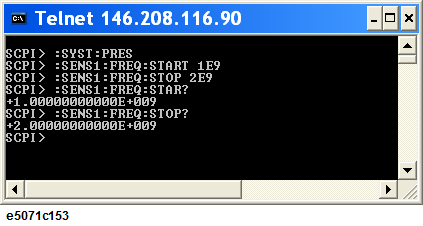
Press ] while holding down Ctl in the telnet screen to break the connection to the E5072A. The telnet prompt appears. At the telnet prompt, type quit and press the Enter key. The connection to the E5072A breaks and telnet finishes.)
When controlling the E5072A from a program on the external controller, use the socket of port 5025 for connection. To use the socket, press System > Misc Setup > Network Setup > Mode > Socket Server.
It is not possible to turn on both Web server and Socket server.
Some functions such as service requests that are available in the GPIB remote control system are not available in control over telnet server.
You can control the E5072A by socket programming using the C language in the UNIX environment, or Visual C++ or Visual Basic in the Windows environment.
For socket programming, the library for network connection on the TCP/IP protocol is required. For the UNIX environment, BSD (Berkeley Software Distribution) Sockets API is available; for the Windows environment, WinSock (WinSock1.1 and WinSock2.0) created by porting BSD Sockets to Windows and expanding it is available.
For more information on the control method, see a sample program for control using WinSock described in "Controlling Using Telnet Server".
Keysight VEE allows you to control the E5072A through the connection to the socket of port 5025 using To/From Socket. The following figure shows an example (when the IP address of the E5072A is 146.208.116.90). Enter 5025 in Host Name to specify the port for connection (1 in the following figure) and enter the IP address or host name of the E5072A in the field to specify the host name (2 in the following figure).
Example of control using Keysight VEE
